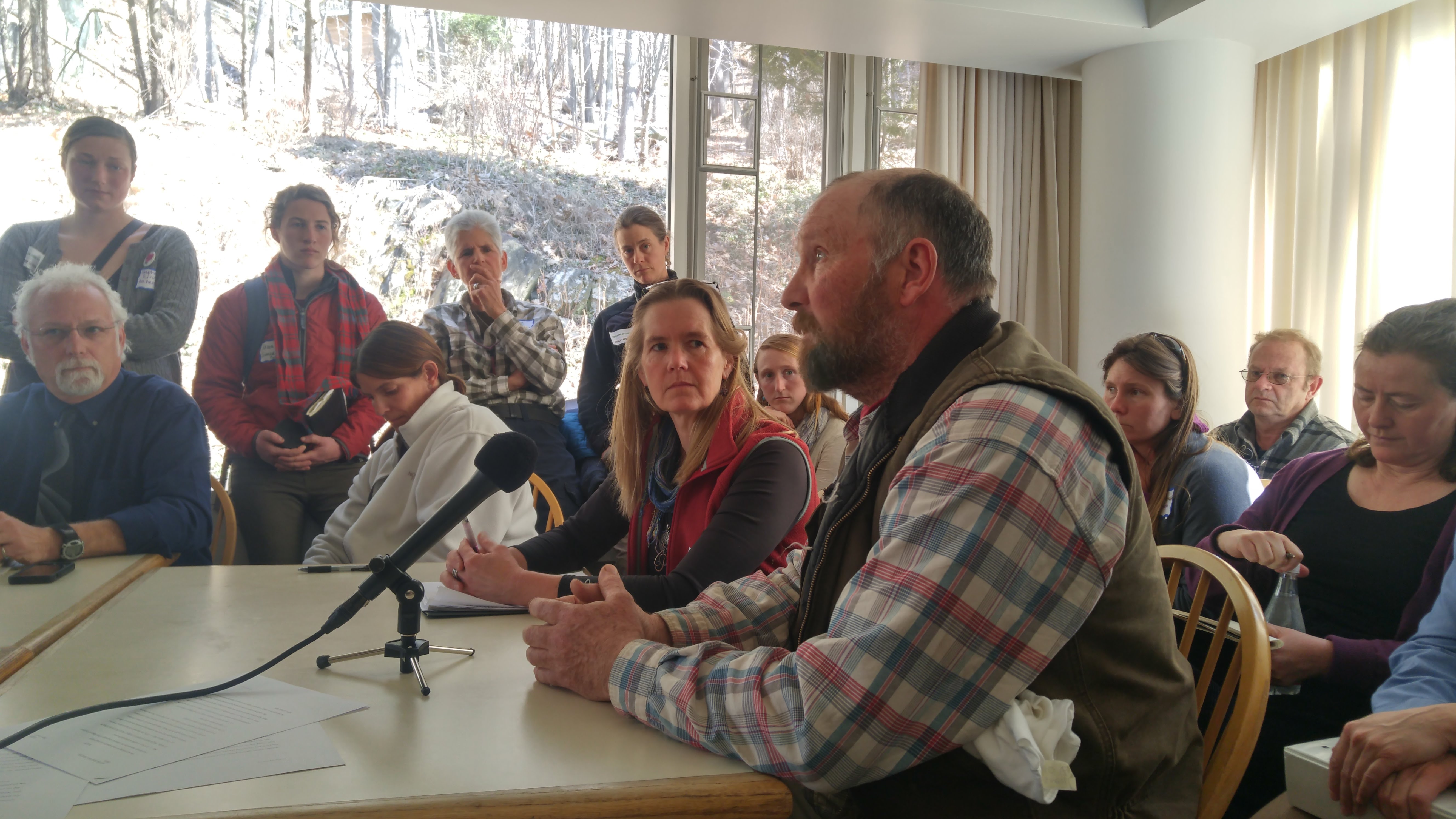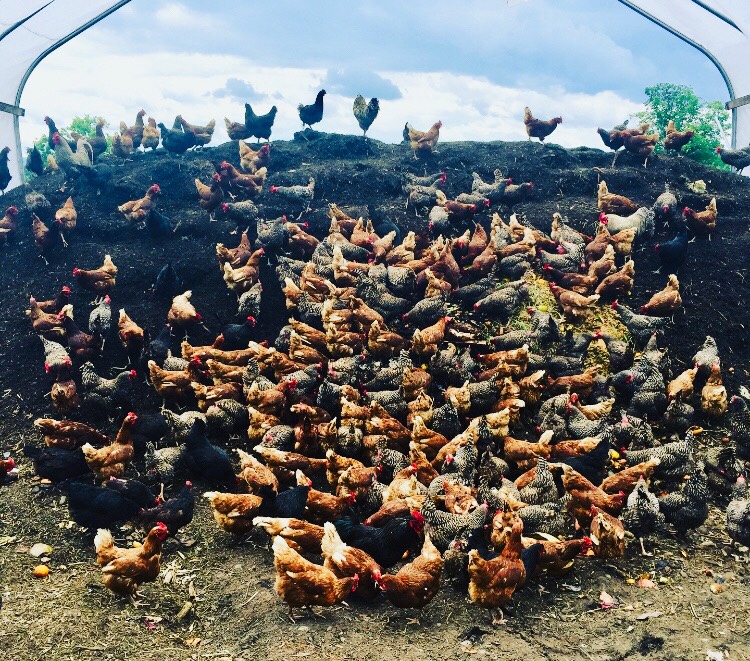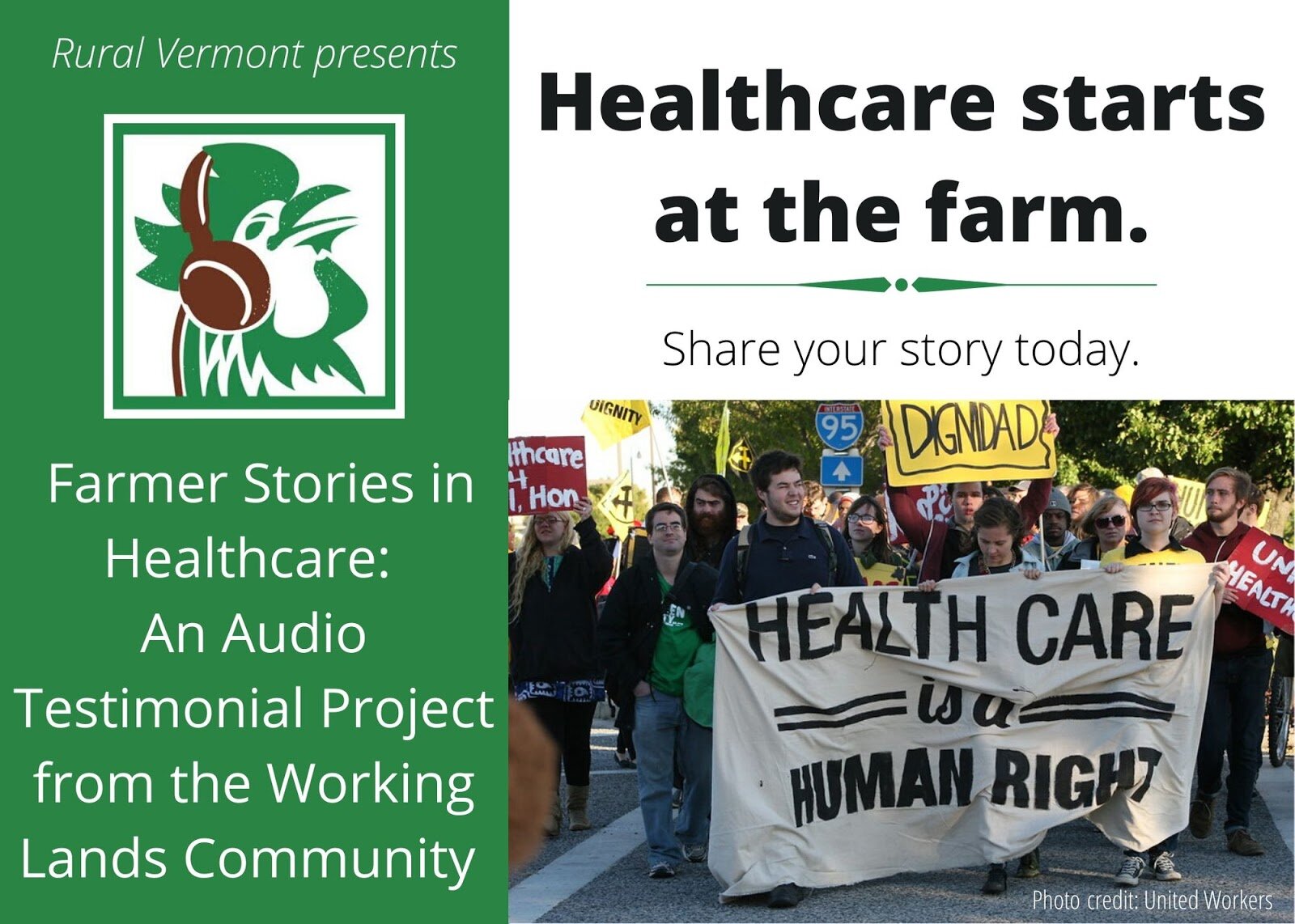1985

Rural Vermont is founded by a group of dairy farmers in order to amplify their voices in the face of falling prices, rising costs, and increasingly burdensome regulation.
1986

Rural Vermont organizes a series of milk dumping actions to protest a federally mandated price cut attributed to a surplus of dairy. As a result of these actions, Vermont’s dairy farmers won a first-in-the-nation $.50/hundredweight direct payment from the state to compensate for the federal price cut.
Late 80s
By working to reform Vermont’s Current Use program, which supports farmers by assessing property tax rates according to land use, Rural Vermont is able to improve economic justice for the state’s farmers.
1994
Thanks in part to years of public education and advocacy on the part of Rural Vermont, Vermont becomes the first state in the country to legislate mandatory labeling of dairy products made from cows injected with recombinant bovine growth hormone (rBGH).
Mid-90s

Concerned about their deleterious impact on American farmers, Rural Vermont organizes and campaigns extensively against the General Agreement on Tariffs and Trade (GATT) and the North American Free Trade Agreement (NAFTA).
1997
Rural Vermont helps to create the Northeast Dairy Compact. The Compact, which expired in 2001, set a price for fluid milk above the federal price, creating improved viability for Northeast-region farmers.
2002
Organizes to generate a denial of the state’s largest and only factory egg farm’s request to double in size.
2003

Rural Vermont’s Town-to-Town Campaign on GMOs results in 70 Town Meeting Day Resolutions calling for a two-year moratorium on GMO crops.
2004
Rural Vermont successfully advocates for the Farmers’ Right to Know GMO Seed Labeling Act, which puts the UDSA organic standards definition of “genetically modified” into Vermont statute and requires that genetically engineered seeds be clearly labeled as such.
2004
Strengthens the Right to Farm Act to protect reasonable agricultural activities conducted on the farm from nuisance lawsuits.
2006

Successfully advocates for the passage of the Farmer Protection Act, which would have placed the liability for genetic crossover on the corporations that produce the seed rather than on the farmers. The Farmer Protection Act passes through the legislature, but is vetoed by Governor Jim Douglas.
2006
Leads opposition to the proposed National Animal Identification System (NAIS), a federal plan to ear-tag and track the movements of every domestic livestock animal in the US. With the help of Rural Vermont and numerous farmers and farm supporters, NAIS is not implemented.
2007
Rural Vermont helps to create and pass the “Chicken Bill,” which allows poultry farmers who raise and slaughter fewer than 1,000 birds on-farm to sell directly from the farm or at farmers’ markets and restaurants. Most importantly, this law does not require expensive farm infrastructure investments or trucking birds to an inspected slaughter facility.
2008
Successfully advocates for the legalization of hemp in Vermont.
2008-2009

Drafts model legislation that ultimately passes and becomes the Farm Fresh Milk Restoration Act, creating a tiered regulatory structure that codifies Vermonters’ access to raw milk, while expanding opportunity and access for producers and consumers alike.
2010
Joining forces with Vermont Businesses for Social Responsibility, Rural Vermont successfully lobbies for the creation of Farm-to-Plate and the funding to support it.
2010
Plays instrumental role in exempting on-farm commercial composting from the Act 250 permitting process.
2011-2012
Successfully advocates for repeal of the provision in the Vermont Hemp Law that requires federal action for the law to go into effect, thus clearing the way for Vermont farmers to plant hemp.
2011 – 2015
Leads the way toward improvements in the regulatory environment surrounding raw milk, including legalization of raw dairy processing classes, the addition of delivery to farmers’ markets, and more reasonable animal health testing requirements.
2012-2014
Working with numerous organizations and individuals, Rural Vermont is instrumental in passing the GMO Labeling Bill, the first “no strings attached” labeling law in the country.
2013
After years of advocacy by Rural Vermont, the traditional practice of on-farm slaughter is legitimized by law, allowing farmers to legally sell animals that are slaughtered in the environment in which they were raised.
2015

Creates numerous opportunities for small-scale farmers to participate in the legislative process of drafting a new statewide water quality law, along with the subsequent regulatory process to draft rules.
2015
Rural Vermont begins working to mobilize farmers around the State to participate in the Required Agricultural Practices rulemaking and legislative processes; and continued to work with the Agency of Agriculture and other farming organizations to monitor and shape the rules through the RAP Development Committee.
2015
Organized with raw milk producers across the state to successfully pass broad and meaningful improvements to Vermont's raw milk law, increasing fairness and expanding economic opportunity for farmers while validating and legitimizing traditional food practices.
2015
Organized a series of six free "Stand Up & Speak Out activist trainings across the state to provide practical skills for effective citizen advocacy.
2016
Successfully advocated to increase the number of animals that could be legally sold through the on-farm slaughter exemption and improved the reporting requirements of the law to better serve the needs of farmers.
2017
Rural Vermont works with numerous poultry producers to dramatically expand the limit on the number of birds a farmer can slaughter on-farm and sell at farmers’ markets and to restaurants. The new bill includes exemptions at 5,000 and 20,000 bird limits, creating tremendous economic opportunity for small-scale producers.
2017

Rural Vermont embarks upon and completes a six-stop community conversations tour known as Groundswell. Over the course of Groundswell, Rural Vermont hears from over 500 constituents about their most pressing needs and how Rural Vermont can most effectively help them meet those needs. Groundswell is one of Rural Vermont’s most ambitious and successful community organizing projects to date, and it will inform the organization’s work for years to come.
2018
Rural Vermont worked with a coalition of organizations in agricultural and municipal planning in order to craft and pass Act 143 Accessory On-Farm Business legislation which creates a consistent framework across the State for towns and farms to approach local development and permitting of businesses which are "accessory" to farm businesses.
2018

Rural Vermont worked with a group of farmers who accept small amounts of municipal food scraps and feed them to poultry to help to coordinate and advocate with them in regulatory conflict with the Agency of Natural Resources and Agency of Agriculture.
2018

Rural Vermont conducted two major surveys, one to all registered hemp growers in the State and one to all of our members to assess needs and priorities for the 2018-2019 Legislative session.
2018

Rural Vermont launched the Pitchfork Series to deepen the discussion around issues raised during the Groundswell Tour, including events such as the Statehouse to Farmhouse series.
2019
Regularly joined Farm and Watershed Coalition meetings, which address the intersection of the dairy community and water quality, and continued to engage in the issue of corporate consolidation in the dairy industry.
2019
Successful improvements made to the raw milk law, including warning sign simplification and reduction in size, legalization of direct sales at farmers’ markets for tier two producers, and the allowance of raw milk as an ingredient in commercial pet food.
2019
Continued advocacy and engagement with stakeholders to ensure that the processes and outcomes of any “Payment for Ecosystem Services” programs in VT are equitable, informed by a diversity of farmers’ voices, adequately consider varied ecological outcomes, and are situated within a greater context of a transition to an agricultural and food system that is economically, ecologically, and socially just.
2019
Made crucial improvements to the On-Farm Slaughter law, including multiple owners of animals, and extended the law’s sunset. Began collaborating with itinerant slaughterer Mary lake offering on-farm slaughter and meat cutting and processing workshops.
2019

Launched Farmer Stories in Healthcare project; submitted comments in writing and in person in opposition to insurance rate hikes, citing research and stories about the lack of access, insufficient coverage, and affordability of healthcare in the farming community.
2019
Supported updates to VT’s Hemp Law (Act 44) to bring VT’s Hemp Program into compliance with the provisions of the 2018 federal Farm Bill; successfully recruited hemp farmers - in particular small-scale producers - to submit comments and/or attend the public hearings.
2019
With the Pesticides Coalition, we passed Act 35, making neonicotinoids a restricted class of pesticides and prohibiting the retail sale and use by anyone who is not a certified applicator.
2020

Became a community partner of Regeneration Corps, which offers high school students academic credit, on-farm experiences, and education about the intersections of regenerative agriculture, climate change, and racial justice.
2020
Became a plaintiff in a federal lawsuit filed by the Center for Food Safety against the USDA for implementing a federal law preempting the 2016 Vermont GMO labeling law.
2020

Forged a coalition with NOFA-VT, the Vermont Growers’ Association, Justice For All, and Trace VT to advocate for an end to the criminalization of cannabis and a just transition to a tax and regulate system which is agriculturally, economically, and racially equitable, accessible, and reparative. S.54, the tax and regulate cannabis bill, became law with the provision that it is not an agricultural crop, despite our advocacy for it to be considered so.
2020
Collaboratively launched a statewide Soil Health Policy Network listserv to build connections and research/design policy among soil health stakeholders; partnered with the Center for Ag & Food Systems at VT Law School to analyze the progress of the Payment for Ecosystem Services & Soil Health Working Group.
2020

COVID RELIEF: Successfully advocated for $5M in COVID-19 relief for agricultural and working lands businesses who had previously been left out of federal aid money for pandemic-related loses; successfully advocated for farmers' markets to be considered essential businesses so they could open; established a Farmers’ Market Relief Fund and distributed $14,240 to 32 markets across Vermont to support implementation of new COVID protocols; and, amplified Migrant Justice's call for the creation of a $5M Vermont Immigrant Families COVID Relief Fund
Photo credit: 2018 Chicken Compost- Vermont Compost Company.

